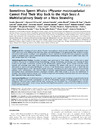Identificador persistente para citar o vincular este elemento:
https://accedacris.ulpgc.es/jspui/handle/10553/47523
| Título: | Sometimes sperm whales (physeter macrocephalus) cannot find their way back to the high seas: A multidisciplinary study on a mass stranding | Autores/as: | Mazzariol, Sandro Guardo, Giovanni Di Petrella, Antonio Marsili, Letizia Fossi, Maria Cristina Leonzio, Claudio Zizzo, Nicola Vizzini, Salvatrice Gaspari, Stefania A. Pavan, Gianni Podestà, Michela Garibaldi, Fulvio Ferrante, Margherita Copat, Chiara Traversa, Donato Marcer, Federica Airoldi, Sabina Frantzis, Alexandros Bernaldo De Quirós Miranda, Yara Cozzi, Bruno Fernández Rodríguez, Antonio Jesús |
Clasificación UNESCO: | 240119 Zoología marina 240118 Mamíferos 3109 Ciencias veterinarias |
Palabras clave: | Polycyclic Aromatic-Hydrocarbons North-Sea Genetic Diversity Marine Mammals Methyl Mercury, et al. |
Fecha de publicación: | 2011 | Publicación seriada: | PLoS ONE | Resumen: | Background: Mass strandings of sperm whales (Physeter macrocephalus) remain peculiar and rather unexplained events, which rarely occur in the Mediterranean Sea. Solar cycles and related changes in the geomagnetic field, variations in water temperature and weather conditions, coast geographical features and human activities have been proposed as possible causes. In December 2009, a pod of seven male sperm whales stranded along the Adriatic coast of Southern Italy. This is the sixth instance from 1555 in this basin. Methodology/Principal Findings: Complete necropsies were performed on three whales whose bodies were in good condition, carrying out on sampled tissues histopathology, virology, bacteriology, parasitology, and screening of veins looking for gas emboli. Furthermore, samples for age determination, genetic studies, gastric content evaluation, stable isotopes and toxicology were taken from all the seven specimens. The animals were part of the same group and determined by genetic and photo-identification to be part of the Mediterranean population. Causes of death did not include biological agents, or the "gas and fat embolic syndrome", associated with direct sonar exposure. Environmental pollutant tissue concentrations were relatively high, in particular organochlorinated xenobiotics. Gastric content and morphologic tissue examinations showed a prolonged starvation, which likely caused, at its turn, the mobilization of lipophilic contaminants from the adipose tissue. Chemical compounds subsequently entered the blood circulation and may have impaired immune and nervous functions. Conclusions/Significance: A multi-factorial cause underlying this sperm whales' mass stranding is proposed herein based upon the results of postmortem investigations as well as of the detailed analyses of the geographical and historical background. The seven sperm whales took the same "wrong way" into the Adriatic Sea, a potentially dangerous trap for Mediterranean sperm whales. Seismic surveys should be also regarded as potential co-factors, even if no evidence of direct impact has been detected. | URI: | https://accedacris.ulpgc.es/handle/10553/47523 | ISSN: | 1932-6203 | DOI: | 10.1371/journal.pone.0019417 | Fuente: | PLoS ONE [ISSN 1932-6203], v. 6 (5), (e19417) |
| Colección: | Artículos |
Citas SCOPUSTM
95
actualizado el 08-jun-2025
Citas de WEB OF SCIENCETM
Citations
90
actualizado el 22-feb-2026
Visitas
63
actualizado el 25-may-2024
Descargas
79
actualizado el 25-may-2024
Google ScholarTM
Verifica
Altmetric
Comparte
Exporta metadatos
Los elementos en ULPGC accedaCRIS están protegidos por derechos de autor con todos los derechos reservados, a menos que se indique lo contrario.
